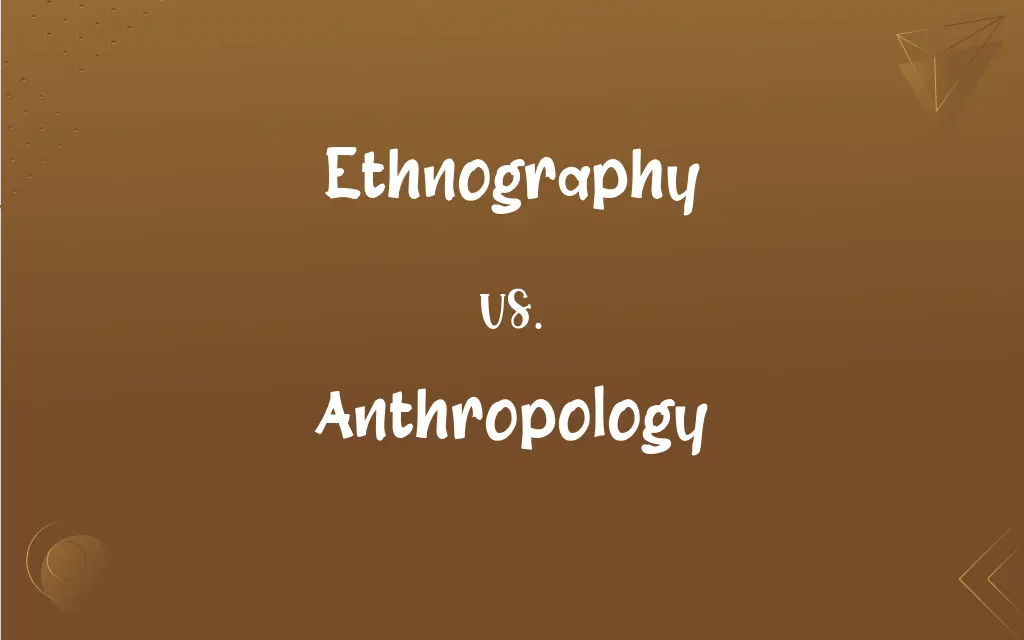Ethnography vs. Anthropology: What's the Difference?
Edited by Aimie Carlson || By Janet White || Updated on October 6, 2023
Ethnography is a research method within anthropology focused on studying cultures through observation and participation. Anthropology is the broader academic discipline that studies human societies, cultures, and behaviors.

Key Differences
Ethnography is a specialized research method within the field of anthropology. It involves studying human societies by participating and observing in the day-to-day life of the community. Anthropology, on the other hand, is a much broader academic field that studies human societies and cultures through various lenses, including history, linguistics, and biology.
While ethnography is primarily concerned with the detailed description of a specific cultural group, anthropology seeks to make generalizations about human behavior and society. Ethnography focuses on the "here and now," often through fieldwork, whereas anthropology may involve historical or comparative research, and could include studies on linguistics, archaeology, or even human evolution.
From a grammatical perspective, both words function as nouns but have different usages. Ethnography tends to be used in contexts specific to cultural studies and fieldwork, often followed by the culture being studied, as in "an ethnography of the Yanomami tribe." Anthropology, however, is often followed by another term that specifies its sub-discipline, as in "cultural anthropology" or "biological anthropology."
In summary, ethnography is a tool or method employed within anthropology for understanding specific cultures through in-depth study and firsthand experience. Anthropology is the overarching field of study that employs various methods and disciplines to understand the complexities of human society and behavior.
Comparison Chart
Scope
Specific method within anthropology
Broader academic discipline
ADVERTISEMENT
Focus
Specific cultural groups
Human societies and behavior
Academic Sub-Discipline
Usually no sub-disciplines
Has various sub-disciplines
Research Methods
Primarily fieldwork
Various, including fieldwork
Grammatical Role
Noun, specific to cultural studies
Noun, often followed by a sub-discipline
Ethnography and Anthropology Definitions
Ethnography
Fieldwork in cultural studies
She conducted an ethnography among the indigenous people.
ADVERTISEMENT
Anthropology
Broad academic discipline
Anthropology encompasses linguistics and archaeology.
Ethnography
Qualitative research method
Ethnography relies on extensive interviews.
Anthropology
Study of human cultures
His field of anthropology focused on ancient civilizations.
Ethnography
Participant observation
His ethnography required living with the community.
Anthropology
Study of human societies
She has a degree in anthropology.
Ethnography
Descriptive study of culture
The ethnography captured the tribe's customs.
Anthropology
Investigation of human behavior
Anthropology can help explain social norms.
Ethnography
In-depth societal analysis
His ethnography examined gender roles in the village.
Anthropology
Examination of human development
Anthropology looks at how societies evolve.
Ethnography
The branch of anthropology that deals with the description of specific human cultures, using methods such as close observation and interviews.
Anthropology
The scientific study of the origin, the behavior, and the physical, social, and cultural development of humans.
Ethnography
A text produced using such methods.
Anthropology
That part of Christian theology concerning the genesis, nature, and future of humans, especially as contrasted with the nature of God
"changing the church's anthropology to include more positive images of women" (Priscilla Hart).
Ethnography
(anthropology) The branch of anthropology that scientifically describes specific human cultures and societies.
Anthropology
The holistic scientific and social study of humanity, mainly using ethnography as its method.
According to anthropology, there are six basic patterns of kinship terminology (i.e., "kin naming systems"): Sudanese, Hawaiian, Eskimo, Crow, Omaha, and Iroquois.
Ethnography
An ethnographic work.
Anthropology
The science of the structure and functions of the human body.
Ethnography
That branch of knowledge which has for its subject the characteristics of the human family, developing the details with which ethnology as a comparative science deals; descriptive ethnology. See Ethnology.
Anthropology
The science of man, including the study of the ditribution of physical and cultural attributes in relation to man's origin, location, history, and environment; - sometimes used in a limited sense to mean the study of man as an object of natural history, or as an animal.
Ethnography
The branch of anthropology that provides scientific description of individual human societies
Anthropology
That manner of expression by which the inspired writers attribute human parts and passions to God. See also anthropopathite, anthropopathism, anthropomorphist.
Anthropology
The social science that studies the origins and social relationships of human beings
FAQs
Is ethnography a part of anthropology?
Yes, ethnography is a research method within anthropology.
Is ethnography only about fieldwork?
Primarily, though it can involve other research methods like interviews.
Does anthropology study modern societies?
Yes, it studies both ancient and modern societies.
What are the sub-disciplines of anthropology?
Cultural anthropology, linguistic anthropology, biological anthropology, and archaeological anthropology are common sub-disciplines.
Is anthropology only about humans?
Primarily, though it can also study human ancestors.
What does anthropology encompass?
Anthropology studies human societies, cultures, and behaviors.
Can ethnography be quantitative?
It is predominantly qualitative but can include quantitative elements.
What's the goal of ethnography?
To provide a detailed description of a specific cultural group.
Can ethnography be biased?
Like any method, it can be, which is why researchers aim for objectivity.
How long does ethnographic research usually take?
It can vary, often lasting from several months to a few years.
Who conducts ethnographies?
Typically anthropologists, but also researchers in sociology, education, and other disciplines.
What is biological anthropology?
It focuses on the physical aspects of human beings, including evolution and genetics.
Is anthropology scientific?
It can be both scientific and humanistic, depending on the approach.
What is cultural anthropology?
It's a sub-discipline of anthropology focused on studying contemporary human cultures.
Can you do an ethnography on your own culture?
Yes, this is known as "autoethnography."
About Author
Written by
Janet WhiteJanet White has been an esteemed writer and blogger for Difference Wiki. Holding a Master's degree in Science and Medical Journalism from the prestigious Boston University, she has consistently demonstrated her expertise and passion for her field. When she's not immersed in her work, Janet relishes her time exercising, delving into a good book, and cherishing moments with friends and family.
Edited by
Aimie CarlsonAimie Carlson, holding a master's degree in English literature, is a fervent English language enthusiast. She lends her writing talents to Difference Wiki, a prominent website that specializes in comparisons, offering readers insightful analyses that both captivate and inform.































































